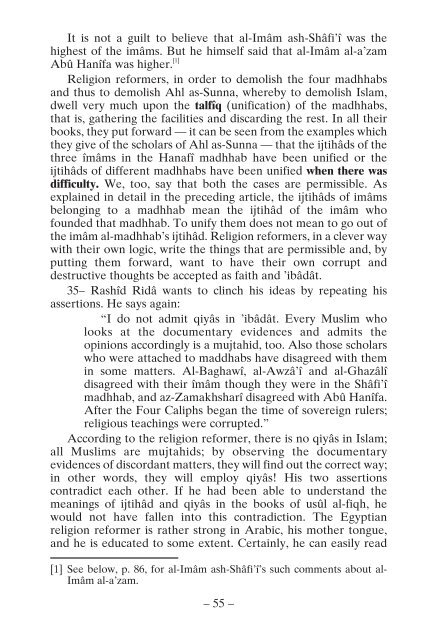Answer to an Enemy of Islam
Answer to an Enemy of Islam This is a refutation of the lies and slanders which the lâ-madhhabî Rashîd Rıdâ of Egypt, who appeared in the disguise of a religious man and wrote against the scholars of Islam in his book Muhâwarât.
Answer to an Enemy of Islam
This is a refutation of the lies and slanders which the lâ-madhhabî Rashîd Rıdâ of Egypt, who appeared in the disguise of a religious man and wrote against the scholars of Islam in his book Muhâwarât.
You also want an ePaper? Increase the reach of your titles
YUMPU automatically turns print PDFs into web optimized ePapers that Google loves.
It is not a guilt <strong>to</strong> believe that al-Imâm ash-Shâfi’î was the<br />
highest <strong>of</strong> the imâms. But he himself said that al-Imâm al-a’zam<br />
Abû H<strong>an</strong>îfa was higher. [1]<br />
Religion reformers, in order <strong>to</strong> demolish the four madhhabs<br />
<strong>an</strong>d thus <strong>to</strong> demolish Ahl as-Sunna, whereby <strong>to</strong> demolish <strong>Islam</strong>,<br />
dwell very much upon the talfîq (unification) <strong>of</strong> the madhhabs,<br />
that is, gathering the facilities <strong>an</strong>d discarding the rest. In all their<br />
books, they put forward — it c<strong>an</strong> be seen from the examples which<br />
they give <strong>of</strong> the scholars <strong>of</strong> Ahl as-Sunna — that the ijtihâds <strong>of</strong> the<br />
three îmâms in the H<strong>an</strong>afî madhhab have been unified or the<br />
ijtihâds <strong>of</strong> different madhhabs have been unified when there was<br />
difficulty. We, <strong>to</strong>o, say that both the cases are permissible. As<br />
explained in detail in the preceding article, the ijtihâds <strong>of</strong> imâms<br />
belonging <strong>to</strong> a madhhab me<strong>an</strong> the ijtihâd <strong>of</strong> the imâm who<br />
founded that madhhab. To unify them does not me<strong>an</strong> <strong>to</strong> go out <strong>of</strong><br />
the imâm al-madhhab’s ijtihâd. Religion reformers, in a clever way<br />
with their own logic, write the things that are permissible <strong>an</strong>d, by<br />
putting them forward, w<strong>an</strong>t <strong>to</strong> have their own corrupt <strong>an</strong>d<br />
destructive thoughts be accepted as faith <strong>an</strong>d ’ibâdât.<br />
35– Rashîd Ridâ w<strong>an</strong>ts <strong>to</strong> clinch his ideas by repeating his<br />
assertions. He says again:<br />
“I do not admit qiyâs in ’ibâdât. Every Muslim who<br />
looks at the documentary evidences <strong>an</strong>d admits the<br />
opinions accordingly is a mujtahid, <strong>to</strong>o. Also those scholars<br />
who were attached <strong>to</strong> maddhabs have disagreed with them<br />
in some matters. Al-Baghawî, al-Awzâ’î <strong>an</strong>d al-Ghazâlî<br />
disagreed with their îmâm though they were in the Shâfi’î<br />
madhhab, <strong>an</strong>d az-Zamakhsharî disagreed with Abû H<strong>an</strong>îfa.<br />
After the Four Caliphs beg<strong>an</strong> the time <strong>of</strong> sovereign rulers;<br />
religious teachings were corrupted.”<br />
According <strong>to</strong> the religion reformer, there is no qiyâs in <strong>Islam</strong>;<br />
all Muslims are mujtahids; by observing the documentary<br />
evidences <strong>of</strong> discord<strong>an</strong>t matters, they will find out the correct way;<br />
in other words, they will employ qiyâs! His two assertions<br />
contradict each other. If he had been able <strong>to</strong> underst<strong>an</strong>d the<br />
me<strong>an</strong>ings <strong>of</strong> ijtihâd <strong>an</strong>d qiyâs in the books <strong>of</strong> usûl al-fiqh, he<br />
would not have fallen in<strong>to</strong> this contradiction. The Egypti<strong>an</strong><br />
religion reformer is rather strong in Arabic, his mother <strong>to</strong>ngue,<br />
<strong>an</strong>d he is educated <strong>to</strong> some extent. Certainly, he c<strong>an</strong> easily read<br />
[1] See below, p. 86, for al-Imâm ash-Shâfi’î’s such comments about al-<br />
Imâm al-a’zam.<br />
– 55 –

















